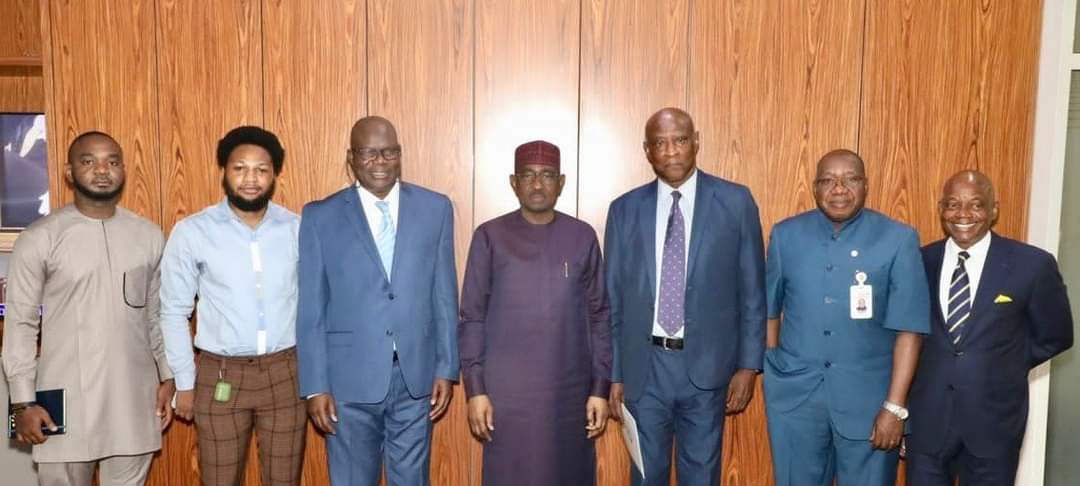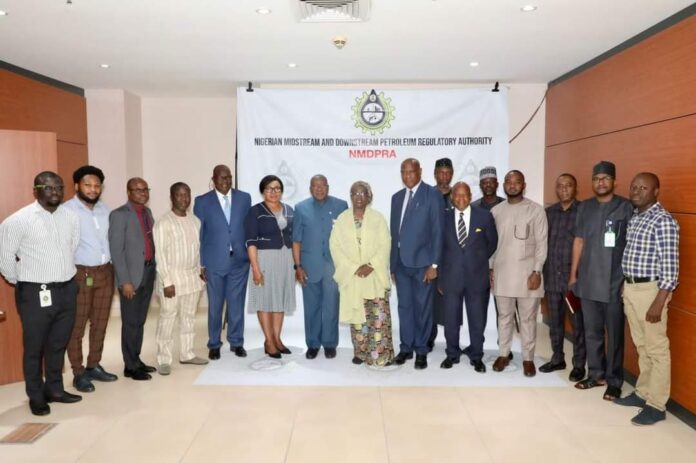… All incentives given to Dangote Refinery should be extended to other refineries
The Crude Oil Refiners Association of Nigeria (CORAN), the umbrella body of indigenous crude oil refiners has appealed to the Central Bank of Nigeria(CBN), to create crude refinery intervention fund like that of Agricultural Credit Fund or the Pharmaceutical Fund domiciled at the CBN to drive effective business operations in-country.
The Association was led by their Board of Trustee’s chairman, Chief Emmanuel Iheanacho made the appeal during their visit to the leadership of the Nigerian Midstream and Downstream Petroleum Regulatory Authority (NMDPRA) in Abuja.
The meeting which was in a bid to interact with all relevant regulatory agencies, after CORAN formal registration and was chaired by the NMDPRA’s Executive Director Hydrocarbons Processing Plants, Installation and Transportation Infrastructure (HPPITI), Mr. Francis Ogaree.
The Secretary of CORAN, Barrister Olusegun Ilori was directed to present CORAN’s position, appealed to the Authority to ensure that all incentives that were given to Dangote Refinery are also extended to other refineries.
The Association urged NNPC/NMDPRA and NUPRC to engage with the licensed modular refineries in order to develop an appropriate commercial model that would guarantee reliable feedstock
Coran also stated that NMDPRA renewal fee of modular refinery license guidelines to be revisited and possibly reduced by way of 50 per cent waiver.
They however said that it should be on the company-by-company assessment, and granted to only companies with credible challenges.
CORAN suggested for annual monitoring of modular refineries to be carried out by the Authority to ensure compliance with government policies.

The Association said NNPC should consider taking equity or grant loans to modular refineries via the provision of reformer/other requirement units to ensure adequate production of PMS based on agreed offtake conditions.
They suggested that the issuance of the import duty waivers for modular refinery equipment be done by the Federal Ministry of Finance after due certification of the equipment that qualified for waiver is done by the Ministry of Petroleum Resources.
CORAN said that modular refinery owners with evidence of feedstock challenge be given preference in allocation of NNPC crude oil.
The Association suggested that Crude oil from the NNPC be sold to modular refinery owners in naira equivalent for that day with guarantee that all the refined PMS be sold in naira equivalent for that day in-country.
According to them, “ The Federal Ministry of Industry, Trade, and Investment (FMITI) to collaborate with Ministry of Petroleum Resources (MPR) on the African Continental Free Trade Area (AfCFTA) with the view of creating a Petroleum refining hub in Nigeria while leveraging on the Agreement;
“Quarterly progress reports on modular refinery projects be sent to the Ministry by NMDPRA.
“The Ministry should liaise with Nigerian Immigration Service to resolve problems associated with issuance of expatriate Quota,” they added.
Responding to CORAN by the management of NMDPRA led by the Executive Director Hydrocarbons Processing Plants, Installation and Transportation Infrastructure (HPPITI), Mr Francis Ogaree and the Executive Director Economic Regulations and Strategic Planning (ERSP) Dr. Zainab Gobir appreciated the association for coming and assured the team that Mr President, Muhammadu Buhari is committed to see that more refineries are functional.
Mr Francis Ogaree further assured CORAN of the Authority’s support and urged they should reach out to the committee that will be setup to work with refineries and hinted of a database of challenges and progress report on ouroperations.
Similarly, Engr. J.G Musa and Mrs. Ngozi Nwokocha who addressed the issues of license renewal fees and the need for CORAN to actively participate in the regulations concerning Midstream and Downstream some of which has been concluded with our members not making their input.
The ED Economic planning also mentioned that with regular consultation some of the CORAN’s issues could be raised at Economic policy levels, pledging support for the association.
Gobir assured that her office will create a dialogue for more communication between the refiners and the Authority.
The Association has been assured of the government’s economic strategic plan to boost refining in Nigeria from a 0.01% to 1%.
“The Authority will support the association, not only as regulators but as partners for progress of the sector rather to ensure that the refining goal and vision for the country is achieved.
At the end of the meeting the following steps were agreed upon;
-Recommendations of CORAN will be reflected in meetings with other oil and gas regulators at available opportunities.
-A working group of operations staff of CORAN members and senior offices of the Hydrocarbons Division to meet regularly to resolve any issues affecting member companies.
-CORAN members to give details of their nominations to Executive Director Hydrocarbons without delay.
– Members of CORAN are to visit the website of the Authority to look at the draft of Regulations being prepared for the purpose of making input to address our concerns. Earlier ones for which our members did not send their input has been published.
– Opportunity for continued dialogue has been created and CEOs of CORAN member companies can have regular.- monthly dialogue or as needed with the authority top management







